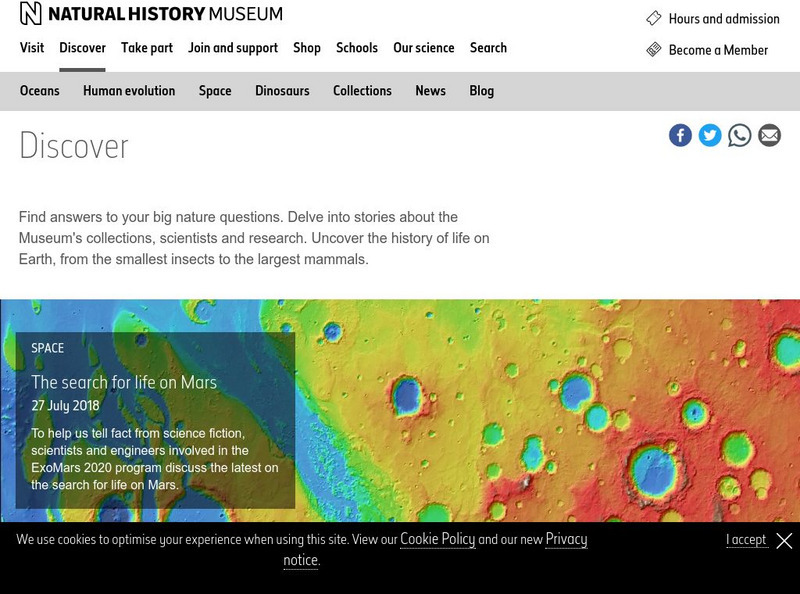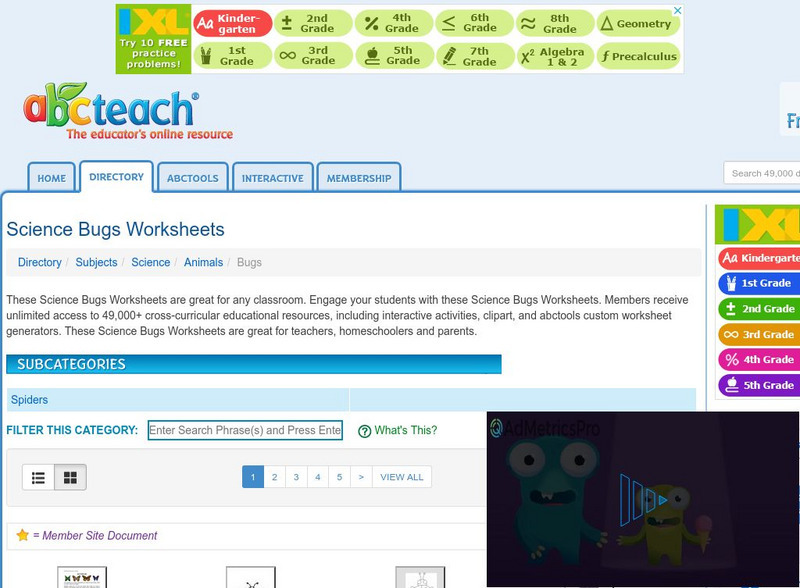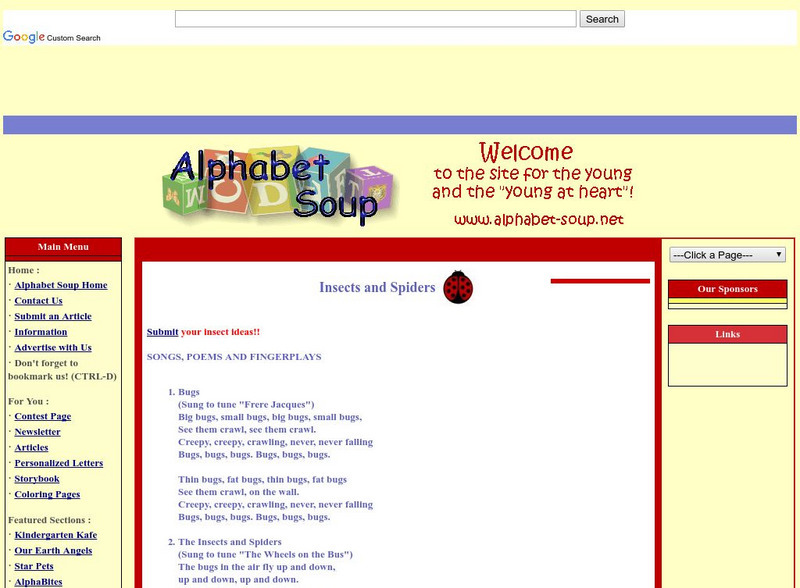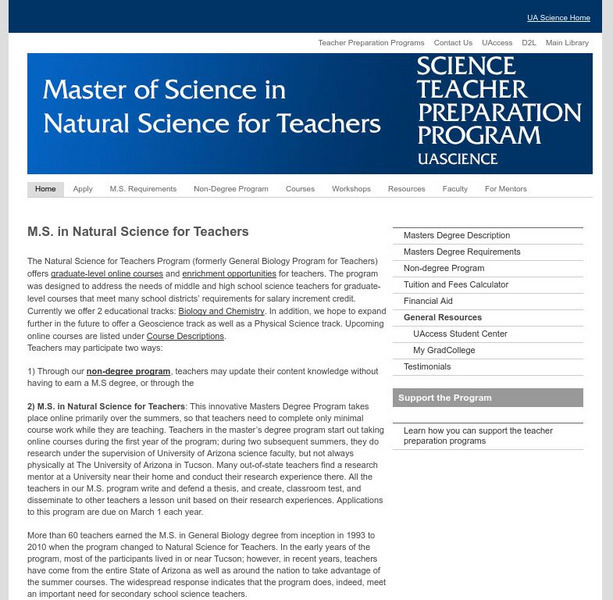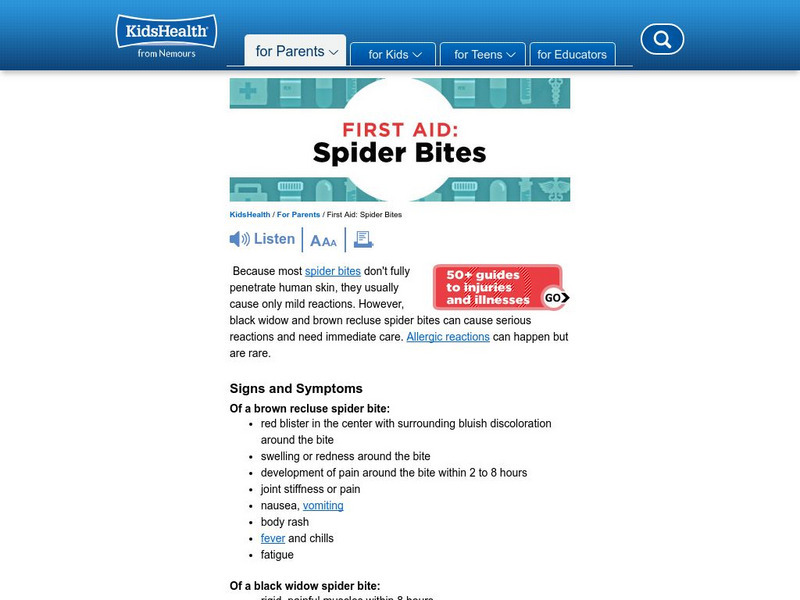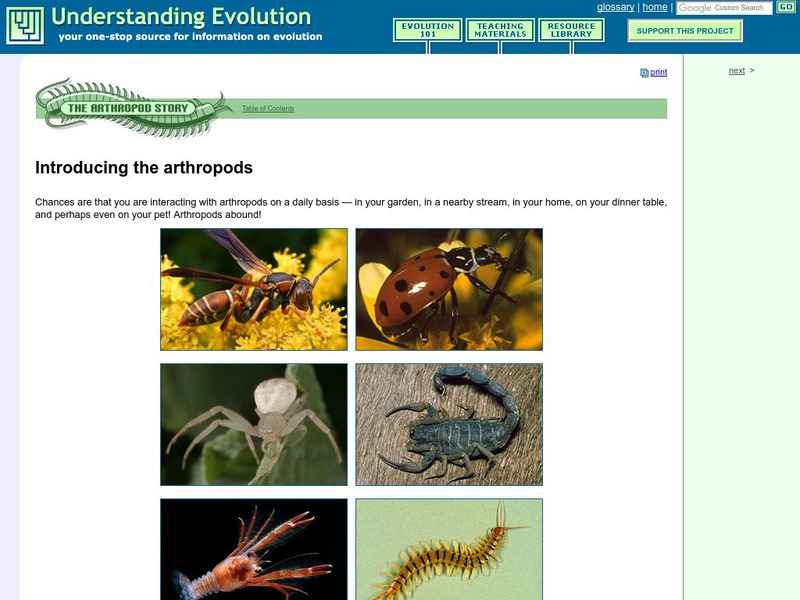Other
Insects.org: Insects on the Web
Explore the fascinating stories of insects and the roles they play in our lives. Check out the photos and descriptions, learn how they help humans, find some great educational resources, and much more.
University of Florida
Florida Museum of Natural History: Animals 2: Insects and Spiders
This teacher's guide focuses on the smaller animals that inhabit our world: insects and spiders. These fascinating creatures provide young children many hands-on opportunities to learn about the diversity of living things, how living...
Texas A&M University
Insects in the Classroom: Lesson Plans
A very comprehensive site that includes insect lesson plans for ages 3-18 and links to a syllabus, course material, activities, and related resources.
Natural History Museum
Natural History Museum: Insects and Spiders
As an online exhibit from the Natural History Museum, this site examines many different subtopics stemming from a study on both insects and spiders. Several of the subtopics include spider bites, bumblebees, moths, edible insects,...
Burke Museum
Burke Museum of Natural History and Culture: The Spider Myths Site
Are spiders insects? Do you really swallow spiders while you're sleeping? Myths and questions related to spiders are addressed on this site. Links to additional information can also be found here.
Read Works
Read Works: Spooky Spiders
[Free Registration/Login Required] An informational text about spiders and how helpful they can be. A question sheet is available to help students build skills in reading comprehension.
PBS
Pbs Learning Media: Garden Spiders
In this video segment from Garden Insects, learn about six varieties of spiders that live in one garden. [2:40]
DOGO Media
Dogo News: Crafty Wasps Turn Spiders Into Web Weaving Slaves
Read about the effect a certain parasitic wasp can have on spiders. Includes video.
Science Education Resource Center at Carleton College
Serc: A Study of Spider Webs
Many people do not like spiders and consider them pests. However, spiders provide a service to humans. They eat many of the insects that bother people. In this 7th grade life science activity, students will study 4-6 spider webs and...
abcteach
Abcteach: Insects
[Free Registration/Login Required] Learn about the insect world using activities and lesson plans that emphasize cross-curricular learning.
Iowa State University
Iowa State University: Iowa Insect Information Notes Wolf and Fisher Spider
Wolf spiders and Fisher spiders are some of the most common. This article has a little bit of information about them and how they hunt. Also included is information about what to do when they are a pest in the house.
Language Guide
Language Guide: Los Insectos
Colorful pictures display various types of insects. You can hear the correct Spanish pronunciation and see the correct spelling by holding your mouse over the picture.
University of Kentucky
University of Kentucky: Brown Recluse Spider
Webpage reference on the brown recluse spider which is more poisonous than a black widow and is more often found infesting homes and businesses.
Other
Alphabet soup.com: Insects and Spiders
An extensive list of activities, songs, poems, and fingerplays are listed by alphabet-soup.com. Additional recipes, art projects, and literature connections are also included.
University of Arizona
Univ. Of Az: Spiders: An Organism for Teaching Biology
Students capture spiders and then conduct various experiments to identify their spider, analyze its feeding rate, and discover its effect on populations of insects. Includes directions for student activities and teaching tips.
PBS
Pbs Teachers: Scientific American: Spider Web Making Stratagems
Investigate spiders in Panama that use UV-reflecting silk in their webs to attract their prey. Build a device that traps flying insects, experimenting with different light sources to choose the best lure.
Other
Insectclopedia: Lesson Plans
A very comprehensive site from pedagonet.com that includes lesson plans on insects for all ages and grade levels. Learners will enjoy learning about insects as you employ these engaging lesson plans in your own classroom.
Other
Cindy Mark: What's Bug'n You
Students will enjoy learning more about bugs in this engaging resource. Allows users to draw a picture of a spider, create an insect information book, discover how insects move and be able to tell where insects live.
Curated OER
Kids Health: Spider Bites Instruction Sheet
How can spider bite affect the body? What should you do if you are bitten by a spider? Learn the answers to these questions, and also learn how to detect the signs and symptoms of a sever allergic reaction to a spider bite.
Curated OER
Kids Health: Insect Stings and Bites
What do you do if you a stung by a bee, wasp, hornet, or yellow jacket? This website explains what these insects leave behind on your skin and tells how you should treat stings. Also included is first-aid care for spider bites and tick...
HotChalk
Hot Chalk: Lesson Plans Page: Spooky Spiders
This simple lesson plan is designed to introduce young students to the characteristics of a spider and to classify whether a spider is an insect or an arachnid by analyzing its characteristics.
PBS
Pbs Teachers: Scientific American: Calls of the Wild: Spider Sounds
Explore the communication rituals of insects and other arachnids by constructing a device capable of detecting minuscule impacts of cricket feet.
National Pest Managment Association
Pest World for Kids: Bug Builder
Create an ant, a bee, a spider, a cockroach, or a bug of your own design. Use the camera feature to save it to a gallery, and even email it to yourself.
University of California
Understanding Evolution: Introducing the Arthropods
This extensive look at the arthropod provides enough information for any budding naturalist, but will also be interesting to one casually interested in insects, spiders, and crustaceans. The pictures are outstanding, and the writing is...


